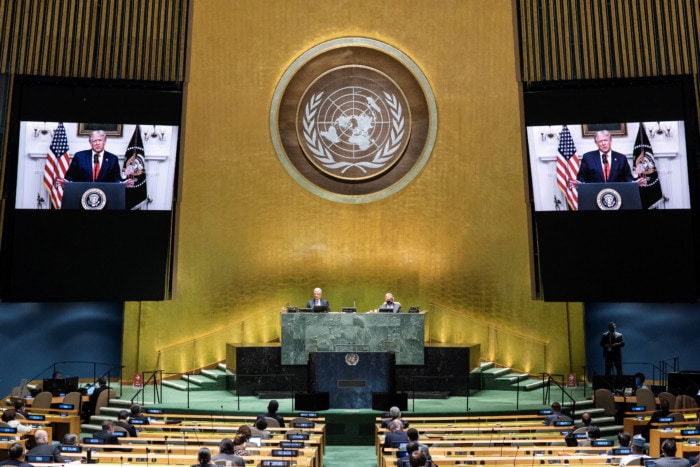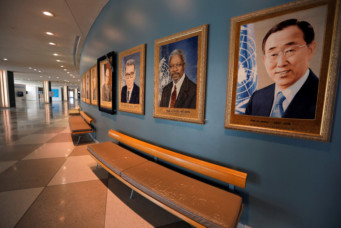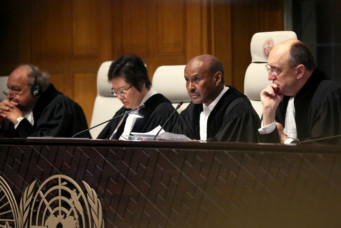The United Nations at 75: Multilateralism at a Crossroads
If the UN survived the Cold War and a later unipolarity, shouldn’t it be thriving in a multipolar world?

Last September, for the first time in three-quarters of a century, the United Nations General Assembly failed to bring together the heads of state and government who traditionally flock to New York each year to participate in its high-level debate. Courtesy of COVID-19, messages were kept virtual with digital technology conveying pre-recorded speeches, as a single attendant from each member state sat behind their corresponding country plates at UN headquarters. The British media spoke of a seventy-fifth “unhappy birthday”.
However, UN Secretary-General Antonio Guterres had already adopted a somber tone since before the transformation of the health alert into a global pandemic. In January 2020, he conjured the “Four Horsemen of the Apocalypse” to identify the most serious challenges facing the international community today: an increase in geopolitical tensions, the climate crisis, rising inequality at the heart of inequitable globalization, and the ominous side of the technological revolution. In his opening statement before an empty General Assembly hall last month, he brought up a fifth horseman: the global health crisis unleashed by the new coronavirus—described as the greatest test since the creation of the United Nations, and a defining moment for modern society. What are the implications of this diagnosis for the future of multilateralism?
Some observers suggest that multilateralism had been undergoing a long crisis since the Al-Qaeda attacks of September 11, 2001. The universal manifestations of solidarity toward the victims of those attacks were still fresh in our memories, as the real and perceived interconnection between terrorism and security in the Middle East further inflamed an already unstable region. As the only source of legitimacy for military intervention in situations other than self-defense, the Security Council was placed under stress by the war in Iraq, raising doubts as to the enduring relevance of a core obligation inherent to the multilateral system. With the benefit of hindsight, former Secretary-General Kofi Annan would contend in his memoirs that “far worse would have been a rubber stamp for a war fought on false premises. From such a misjudgment, the road back to credibility and legitimacy in the eyes of the world would have been far harder”.
The so-called unipolar moment may have peaked in 2003, with a trend toward multipolarity gaining visibility after the 2008 financial crisis, when the G-7 was replaced by a more inclusive group of twenty participants at the annual summits on economic coordination. Current international dynamics are often labeled as multipolar, even if considerable military and economic power continues to be wielded by the United States, and China’s path toward the number one position in terms of GDP places it in a category by itself. It appears that remnants of unipolarity still coexist, along with elements of bipolarity. When Secretary-General Guterres speaks of “multidimensional multipolarity”, he seems to be hinting at this complex geopolitical rearrangement, in which the diplomatic, economic, or military capabilities to influence outcomes are undergoing a significant process of redistribution.
Threats to the Global Economy and Security
Guterres has also alluded to a “Great Fracture” as an especially dangerous scenario in which the two largest economies, with their own priorities and internet capacities, risk creating a new global geo-strategic and military divide. Needless to say, the sort of international cooperation required to confront the current health and climate challenges, along with the worst economic crisis since the Great Depression, is not made easier by a geopolitical transition that is challenging multilateralism in new ways.
The UN at 75 faces a complex crossroads. It is possible to argue, however, that if the UN and the Bretton Woods institutions survived the Cold War and held their sway during the unipolar moment, there is no structural reason why they should be unable to retain their roles, and even thrive, in a more multipolar world. It is also possible to state that multilateralism has been delivering important results in the early 21st century. The consensus decisions achieved in 2015—with the adoption of the 2030 Agenda for Sustainable Development and the Paris Agreement on Climate Change—are noteworthy examples.
The picture is less encouraging when it comes to the promotion of peace and security. Indeed, the strategic perils announced by the First Horseman of the Apocalypse mentioned by the Secretary-General pose a systemic threat, rife with problematic consequences for the entire gamut of issues requiring international cooperation: from health and the environment to sustainable development and human rights. Yet, even in this domain, the panorama is not entirely negative. The call for a global ceasefire, prompted by the pandemic, has received significant support from governments, civil society and academia, and has created opportunities for diplomacy.
While the dangers posed by an increasing number of nuclear warheads places the world under higher levels of alert, and the threat of nuclear proliferation persists, a Treaty on the Prohibition of Nuclear Weapons was successfully negotiated with the active involvement of non-governmental participants. Thanks to its central role, the International Campaign to Abolish Nuclear Weapons (ICAN) was awarded the 2017 Nobel Peace Prize. The Norwegian Nobel Committee explicitly admitted that it was under no illusion that an international prohibition would eliminate nuclear weapons. The prize can be interpreted, however, as recognition that a pioneering brand of multilateralism, which opens the door to civil society, can raise awareness and pressure the general public to unite around vital goals for humankind.
In his 2014 book entitled “World Order”, former U.S. Secretary of State Henry Kissinger undertakes a valuable and insightful analysis of our contemporary international environment. He says today’s unprecedented geopolitical transition coexists with manifestations of radical ideologies that contemplate a withdrawal from the sovereign nation State paradigm created through the treaties of Westphalia in 1648. In answer to the question “where do we go from here”, Kissinger establishes upfront that “a reconstruction of the international system is the ultimate challenge to statesmanship in our time”. The penalty for failing, he adds, is not necessarily a major war, but principally “an evolution into spheres of influence identified with particular domestic structures and forms of governance”—a landscape similar to the ‘Great Fracture’ mentioned by Guterres. Kissinger’s vision for the future is articulated as “a world order of states affirming individual dignity and participatory governance, and cooperating internationally in accordance with agreed-upon rules”.
Security Council Reform?
In UN terms, references to “participatory governance” and “agreed-upon rules” bring to mind the decision-making processes and composition of the organization’s principal organs, on the one hand, and the importance of ensuring that international law is upheld by all and allowed to evolve, on the other. In no other forum within the UN system is the deficit in equitable participation more obvious than in the Security Council. With the redistribution of diplomatic influence, it has become vital and urgent to expand the organ entrusted with the primary responsibility for the maintenance of international peace and security.
An obsolete Security Council is incompatible with the kind of strengthened multilateral system required to navigate the current turbulence just as the G7 was considered insufficiently inclusive to face the 2008 economic crisis. But beyond the need for participatory mechanisms there is scope for seeking to refine the conceptual frameworks for the promotion of a more peaceful world. This is already happening, to some extent, as the twin resolutions on ‘sustaining peace’ adopted by the Security Council and the General Assembly in 2016 indicate. Attempts at refining conceptual tools, however, presuppose a reaffirmation of the lasting relevance of key Charter provisions. The future of modern society and international cooperation would indeed be at stake should the core understandings outlawing the use of force suffer any erosion. These Chapter VII constraints on unilateralism represented a step forward for civilization in 1945 and have acquired a lasting stature.
To put an end to the multiple conflicts that continue to inflame numerous parts of the world –Africa and the Middle East in particular– Secretary-General Guterres has called for a ‘surge’ in diplomacy. To ensure that countries do not relapse into conflict and that situations of tension do not degenerate into belligerence, he has prioritized ‘prevention’ in the agenda for sustaining peace. These are not revolutionary ideas, but rather simple admonitions that reflect the painful lessons of the past few years in which military interventions, irrespective of their motives, have created more problems than solutions.
In remarks to the Security Council, as he began his tenure at the UN in 2017, Guterres argued in favor of a need to ‘rebalance our approach to peace and security’, which he considers to have been previously dominated by responding to conflict rather than preventing war and sustaining peace. According to this reasoning, he acknowledges that member states have been mistrustful of placing an emphasis on prevention, due to understandable concerns over sovereignty. While recognizing that prevention should never be used to serve hidden agendas, Guterres considers, rather, that “prevention is best served by strong sovereign states acting for the good of their people”.
In a 2018 report on Peace Building and Sustaining Peace, the secretary-general stated in his conclusions that “sustaining peace is first and foremost a responsibility of member states. The mirror image of a United Nations system that is better oriented toward prevention, human rights and sustainable development is a membership that sees these as mutually reinforcing, sovereignty-affirming and within national interests.”
The notion of prevention as a sovereignty enhancer introduces a new perspective to discussions that began during Annan’s tenure, in the aftermath of Rwanda and Srebrenica. A moral imperative to exercise a collective responsibility in preventing such atrocities from ever happening again – including through military intervention if necessary – led many to view sovereignty as an obstacle to prevention. The notion of a “responsibility to protect” (R2P) sought to overcome a possible incompatibility between respect for the non-interference Charter provisions of Article 2.7 and a moral duty to defend human lives. R2P gained general acceptance in the 2005 UN World Summit Outcome and entered the halls of the Security Council in 2011, through UN Resolution 1973 on the Libyan crisis. Another set of concerns was brought to the fore by interventions which instead of promoting peace and stability ended up disseminating war and terrorism, even if unintentionally. A Responsibility while Protecting (RwP) was posited as a necessary corollary to R2P, in a note circulated by the Delegation of Brazil to the Security Council (UN General Assembly – Security Council. Document A/66/551 – S/2011/701).
A State Responsibility
As the host country to the 2019 Aswan Forum on Sustainable Peace and Development in Africa, Egypt embraced the view that conflict prevention is a state responsibility, requiring leadership and commitment. The Forum’s set of conclusions proposes a “paradigm shift from crisis management to sustainable peace and development”, while endorsing the idea that conflict prevention can become a sovereignty enhancer. This may seem like a minor modulation, but its systemic implications should not be underestimated. In a broader sense, Harvard Professor Stephen Walt adopts a similar stance in a 2020 article entitled “Countries should mind their own business: two cheers for a classic idea that’s been out of fashion for too long”.
Walt is straightforward in pointing out that those who interfere in foreign countries “rarely understand what they are doing, and even well-intentioned efforts often fail due to ignorance, unintended consequences or local resentment and resistance”. No roundabout formulas are employed in identifying Libya as an example of the above. As he reminds us, “the idea that individual nations should be (mostly) free to chart their own course at home remains deeply embedded in the present world order”. His conclusion is that respect for boundaries and sovereignty will ultimately help countries with different values to cooperate on critical issues.
The concept of the sovereign territorial state may have been with us since the 1648 treaties of Westphalia, but, in contrast with 17th century Europe, we have today a body of universally accepted international laws and principles around which to unite and cooperate. Former Australian Prime Minister Kevin Rudd recently stated that, although the UN at 75 has demonstrated a vocation for longevity, one should not assume it is capable of automatic “self-regeneration”. As the international community grapples with a complex crossroads confronting multilateralism, the necessary vehicles to move in the right direction include a reaffirmation of important established norms, overdue structural reforms, and a renewed look at ideas that may have seemed old-fashioned until recently.
Antonio de Aguiar Patriota is the current Ambassador of Brazil to the United Kingdom. He served as Minister of Foreign Affairs (2011-2013), Secretary-General of Foreign Affairs (2009-2010), and as Brazil’s Ambassador to the United States (2007-2009), to Italy (2016-2019), and to Egypt (2019-2023), as well as Permanent Representative of Brazil to the United Nations (2013-2016).
Read More



